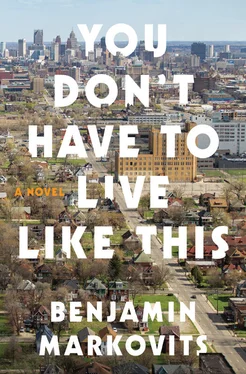“Is your mother still giving you money?” I said.
“Not anymore. That’s part of what this is about — I want to get clear of all that. When you accept people’s money you have to listen to their opinions about you. The last time I went home, I was sitting around with nothing to do, and my mother said to me, why don’t I ever hear you playing the piano? You used to play so beautifully. It just sits there all the time and doesn’t get any use. We had this argument about it. I found myself taking the position that I was never particularly good at the piano and didn’t have any more talent for that than for anything else, which is probably true. But then I thought, what are you doing, why are you having this argument with her. She’s your mother. What do you care if she thinks you used to have talent. Let her think it. I’m still too caught up in all that stuff, it doesn’t matter anymore.”
“What stuff?”
“You know, the precocities of youth.”
“I’m glad you’re here. You’ve put me in a completely different frame of mind.”
“Robert told me you were in bad shape.”
“That’s not quite right,” I said. “I go through these swings, and right now I’m feeling everything pretty intensely. But that can be good, too. You look well.” In fact, he looked like he always looked, tired and overweight, and pimply around the mouth and by the side of his nostrils. His sneakers were white and very dirty. We walked back against the sunset, and when we passed Joe Silver’s place, people were helping him carry the tables inside. So we helped, too.
On Friday evening, Susie Grabel came up from Oberlin. We all had dinner together. She wasn’t very pretty. Her hair was straight and brown, and she wore it very long, halfway down her back, like a girl who can’t let go of her childhood. Her skin was about the color of fresh yogurt, her eyes were pale blue and nearsighted, but she had one of those wonderful voices or accents that sticks to all the words. She had a deep voice. The dress she wore that first night was like the ones my mother is wearing in photographs of me as a kid. Down to her ankles with a sort of beaded pattern. She asked us if we thought it was dangerous, and Walter said, “It depends who you talk to.”
Walter and I had gone out a few nights before with Kurt Stangel and a couple of other guys. There were five of us in the car — three first-timers, including Walter and me. We were supposed to be learning the ropes. Kurt had said to us, “If anybody has a gun, bring it,” so I sat in the back in the middle with the Remington between my legs. We drove around from midnight until four in the morning. Kurt has two kids, a boy four years old and a girl just six months, and one of the other guys had a ten-year-old daughter.
“It turns out,” I said to Susie, “that your average middle-aged, middle-class American Caucasian has deep-seated fantasies about protecting his children by means of violence. I mean, he dreams of putting his life at risk for the sake of his kids, because that’s all Kurt and this other guy, a trade magazine writer named Todd McConnell, wanted to talk about. What they would do if somebody broke into their house.”
“Did anything happen?” Susie said. “While you were out?”
“Around two a.m. we stopped off at Kurt’s place for coffee and doughnuts. That was probably the most exciting bit. I asked Kurt if he’d seen any action. He said that we were just the scare-them-away gang. Mostly it’s kids looking for TVs. They don’t want to get shot and they don’t want to shoot anybody. They’re still young. But he’s chased a couple of cars around the block; nobody wants to get out of their cars. So far the organized crime has kept away — people aren’t sure why. He thinks there were deals cut with the police department, you know, with some of the gangs, and kept asking me questions about how well do I know Robert James. We had a good time. I haven’t been out like that,” I said, “with a bunch of guys since I was sixteen years old, coming back from debate in my teacher’s minivan.”
Walter said, “Yeah, he held on to his gun like it was soft and furry.”
“What does Kurt do?” Susie asked.
“What do you mean?”
“Well, you said that Todd McConnell wrote for trade magazines.”
“Kurt doesn’t do much. He used to work for Nike in PR and put away some money, but it’s like a cult around there. He was sick of selling stuff. Selling is lying, he said. That’s something else they talked about — Todd offered to get him some freelance work. Put him in touch with a couple of editors. Those two guys were sitting up front and the rest of us just listened to them like a bunch of kids. Kurt pretended to be insulted. That’s not why he got out of public relations, he said. That’s not why he moved here. They seemed to know each other well. His wife’s a lawyer, but she lost her job last year, which Kurt says she didn’t care much about because of the baby. For her first child she got two weeks’ maternity leave and didn’t want to go through that again.”
“Where did they used to live?” Susie said.
“Chicago, I think.”
“But what’s he going to do?”
“I’m not sure he knows. In college he wanted to be an actor, and there’s a movement afoot to get the film industry going in Detroit. A lot of tax breaks. He thinks that if he hangs around enough he might get called up as an extra.”
“What about Todd’s wife?”
“He’s divorced.”
“Is that why he moved here?”
“Partly, I guess. He was working for AutoTrader in Atlanta. But then he got divorced, and his wife moved back to Madison, where her parents live. Then AutoTrader let a bunch of people go and he was one of them. He figured Detroit was closer to Madison anyway, and he could live on the cheap and write freelance about the car industry.”
“People’s lives,” Susie said.
ON SUNDAY NIGHT, WALTER AND I sat up late in his apartment, talking. Susie was on her way back to Oberlin. It’s about two and a half hours in the car, around the western shoreline of Lake Erie. I told him I liked her a lot and asked him how he got up the nerve to make the first move. I mean, you must have been sweating bullets, I said. You always were a heavy-sweating guy.
Walter was very matter-of-fact about the whole thing. She came by during his office hour once to ask him to decipher something he’d written on one of her papers. She was an excellent student; he used to write a lot of commentary. Without thinking much about it, he said to her, I’m very happy to communicate with you about your work, but I’d prefer to do it by email or in the presence of other people. I find you personally attractive and that makes me uncomfortable; I don’t want to make you uncomfortable, too. She blushed and didn’t say much, and left shortly after. But then she came by during his office hour again a few days later, looking determined, and it turned out to be easier than he expected. Does this mean you’re okay with what I admitted to you the other day? he said. And she said, yes, and he said, because I think you’re a knockout.
She was by some distance the smartest kid in her class, he said. “Much smarter than me. I told her it’s a pity you’re set on music, because as a cellist you’re only eager and hardworking. But she knows all that. She wants to teach.”
The more time I spent with Walter, the more I admired him. In college he was kind of a snob, and shy, and still hung up on stuff most people didn’t give a damn about — like cocktail recipes and hi-fi equipment. You needed to “get” Walter. But these days he was good at making friends. He used to go around the neighborhood helping people move house. If someone invited him for a drink, he said yes. He never seemed to be in any hurry; he never had anything more important to do. That counts for a lot. People liked him even if they didn’t understand him.
Читать дальше












